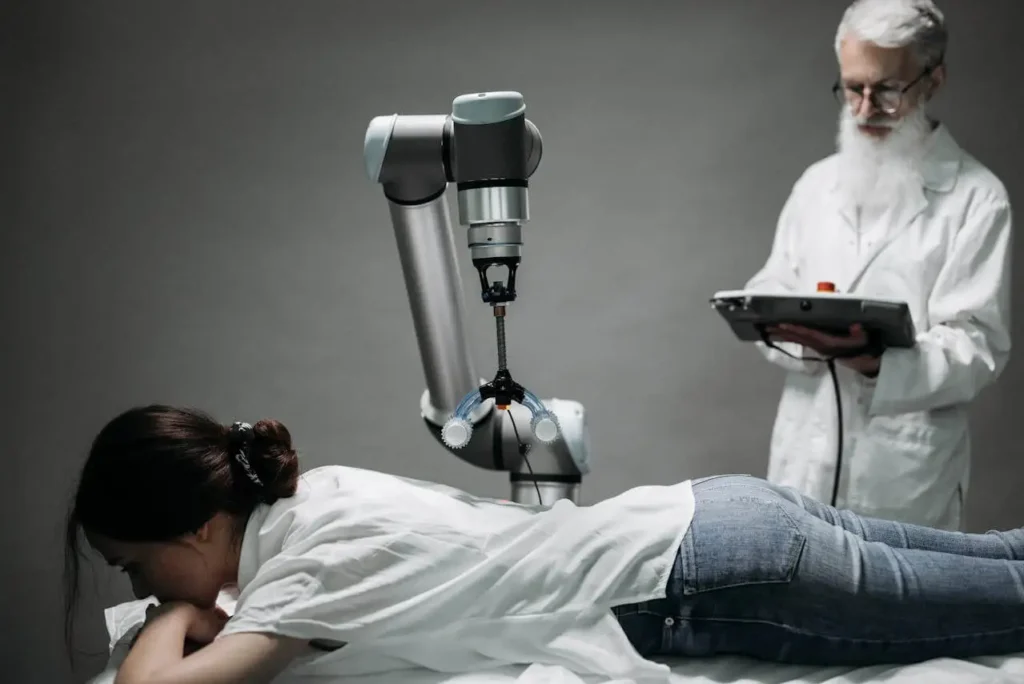AI has changed how we live and this technology is only just getting started. Whether you like to fire up the smart assistant in your phone or plan complex business systems, AI is reshaping our world in exciting ways. We are exploring how artificial intelligence benefits society and drives economic growth. What this means for businesses and communities. Let’s take a look.
How AI is Transforming Our Daily Lives
The impact of AI in society goes far beyond our imagination. In fact, for many of us, AI is just a buzzword. Something you stumble across on your newsfeed or socials. A cool new technology, but not something relevant to you — right?
Wrong. You would be surprised how often you use AI without even knowing it. When Netflix suggests your next favorite show or Google Maps finds the quickest route home, that’s AI working for you. And your 5G network on your phone? It’s likely using AI network slicing to help deliver better, faster service, too.
The role of AI in the economy is only set to grow, making our lives easier and more efficient. While there has been a lot of “buzz” about splashy features and programs like ChatGPT, that’s not where AI’s true potential lies. The reality is even more exciting.
AI in the Economy
The role of AI in the economy continues to grow stronger each year. Yes, it continues! While many lay people first thought of AI as a business tool in late 2022, when ChatGPT was released, it has been around much longer. All the time working behind the scenes to help us.
Artificial intelligence has come a long way since its initial development in the 1950s. The term was first coined at a conference at Dartmouth College in 1956. Researchers were already exploring ways to make computers “think” like humans. Of course, we aren’t quite there yet, but some modern large language modules can feel like it.
Early AI was basic, focusing on simple problem-solving and game-playing. The field saw its first breakthrough in the 1960s with ELIZA, a computer program that could mimic human conversation.
However, in the late 1990s and early 2000s, AI tools began to show real, practical value. Primarily thanks to increased computing power and better data storage. The real game-changer came in the 2010s, when machine learning and deep learning became more sophisticated, leading to tools like Siri (2011), IBM’s Watson (2011) and deep learning systems that could beat humans at complex games.
Today’s AI tools, from chatbots to image recognition software, build on these foundations but are far more powerful and accessible, making them practical for businesses of all sizes to use in their daily operations. Artificial intelligence in society is finally a meaningful force.
As the tools have become more sophisticated, businesses are finding new ways to use them. Many of these solutions increase productivity and create new opportunities. Let’s look at some key areas where AI is making a difference.
Boosting Business Efficiency

Efficiency is every business’s watchword. Luckily, AI in the economy has a lot to offer regarding time savings and improved efficiency. Companies are using AI to streamline their operations in several ways.
Automating Routine Tasks
AI excels at handling repetitive work that used to eat up valuable employee time. That means tasks like data entry, sorting emails, or processing invoices. For example, AI can now scan and process hundreds of receipts in minutes, a job that might take a person several hours. Those hours are wasted. The person is neither using their skill set nor driving productivity. They’re just sorting paper so they can, eventually, get to work.
This sort of innovation is key in artificial intelligence’s benefits to society. It frees up staff to focus on work that needs a human touch, like building customer relationships or solving complex problems.
Smart Decision-Making with Data
Automation is one of the key artificial intelligence benefits to society, but it is far from the only one. AI models excel at spotting patterns in business data—the sort of patterns humans often miss.
This means AI tools can analyze sales information, customer behavior patterns and market trends. Often all at once. This helps business owners make smarter decisions about things like:
- When to order more inventory
- Which products to promote
- What times to schedule more staff
- How to price products competitively
Supply Chain and Inventory Magic
AI in the economy also plays a vital role in managing supplies and products. Modern inventory systems, with a little pinch of AI, can:
- Predict when you’ll run out of items before it happens
- Suggest the perfect time to order more stock
- Spot potential supply chain problems early
- Reduce waste by ordering just the right amount
- Track products from factory to store shelf in real-time
Customer Service Excellence
Customer service is the backbone of the economy. Yet, it can also be a massive time sink. Few customer queries really need human expertise. Most are simply run-of-the-mill questions, common issues and simple troubleshooting. Today, AI-powered chatbots and virtual assistance can help you:
- Answer common customer questions instantly
- Help customers find products they’ll love
- Handle basic support issues 24/7
- Route complex problems to the right human expert
- Remember customer preferences for better service
Process Improvement
Who wouldn’t want an expert in their pocket? Even the most successful business falls prey to bloated processes. Things often start ultra-efficient but can easily crumble into bloated structures. No one thinks to ask why a one-step process takes three steps. But your AI will.
AI tools are like having a constant efficiency expert on staff. They can:
- Map out business processes to find bottlenecks
- Suggest ways to streamline operations
- Reduce errors in paperwork and data entry
- Automate quality control checks
- Keep track of compliance requirements
Cost Control
Another major benefit of AI to the economy lies in cost control. AI helps streamline, simplify and cut down. It also identifies patterns excellently and can proactively act when it detects specific needs. This makes AI essential for tight cost control, helping businesses to:
- Reduce errors that cost money to fix
- Cut down on wasted materials and time
- Find better deals on supplies
- Manage energy use more efficiently
- Predict maintenance needs before expensive breakdowns
The best part? These AI tools are now affordable enough for small businesses to use. You don’t need a vast tech budget to start seeing real benefits in your daily operations.
The Thorny Job Issue: AI and Creating New Jobs and Industries
Historically, when new technology enters, jobs often leave. It’s inevitable in any changing work environment that we see shifts in job needs, titles and availability. Many worry about AI replacing jobs wholesale. The opposite, however, is true. As companies adopt AI technology, they need people who can:
- Develop and maintain AI systems
- Analyze data and make sense of AI insights
- Train others to work with AI tools
- Manage AI projects and implementation
These new roles often pay well and offer exciting career paths. AI’s growth in the economy also creates opportunities for people to learn new skills and take on more interesting work.
Artificial Intelligence Benefits to Society

So, we’ve looked at AI in the economy. But, as important as work is, it’s not all there is in life. Artificial Intelligence in society has the potential to revolutionize the world. Breakthroughs in many key areas are looming or already here. Here are a few areas where AI is making the world a better place.
Making Healthcare Better and More Accessible
This may, in fact, be the biggest way artificial intelligence benefits to society will be felt. Healthcare is notoriously unequal. Many of the poorest among us cannot even access a doctor, let alone lifesaving treatments. Think of rural villages and towns without large hospitals.
One of the most critical ways artificial intelligence benefits society is through healthcare improvements. AI-powered tools help doctors spot diseases earlier and create better treatment plans. For example, AI systems can scan X-rays and identify potential problems faster than human experts. This means patients can get treatment sooner, leading to better outcomes.
AI can also help prevent medical issues through expanded access to healthcare information. Doctors can use AI’s data crunching and pattern recognition to offer personalized solutions and programs to patients. They can use AI’s predictive analysis to improve treatment outcomes and scan for likely red flags, making preventative screening more efficient.
Machine learning systems are also making healthcare more accessible to people in remote areas. Patients can get initial diagnoses and medical advice through AI-powered telehealth platforms without traveling to a doctor’s office. This is especially helpful for people in rural communities or those with limited mobility. We have even seen the first remote surgeries take place with AI’s help.
Retail and E-commerce
Artificial intelligence benefits society through more innovative shopping experiences. Online stores use AI to:
- Show personalized product recommendations
- Predict inventory needs
- Detect fraud
- Handle customer service questions
This makes shopping more convenient for customers while helping businesses run more efficiently. Small business owners can now use AI tools that were once only available to large companies. This helps to equalize the playing field and make business fairer. A small vendor in Calcutta can compete more meaningfully with the “big boys” without inflated staff and infrastructure costs.
Manufacturing and Production
Manufacturing and production are the backbones of human society. Yet many of these industries’ jobs could be safer and less complex. AI tools not only streamline and improve productivity, but they can also make manufacturing safer and better for humans.
Smart factories use artificial intelligence in society to:
- Predict equipment maintenance needs
- Ensure product quality
- Optimize production schedules
- Reduce waste and energy use
These improvements help companies make better products while using fewer resources. Staff are less exposed to more dangerous activities. This is good for society, the economy and the environment. That’s a win for everyone.
Financial Services and Security
With the rise of the tech age came the rise of cybercrime and fraud. Sadly, wherever people go, criminals follow. AI gives us immense potential to detect and ward off these security risks by detecting unusual transactions that might be fraudulent. AI can beef up security measures. It can also respond instantly if unusual traffic is detected. No more waiting around hoping a human catches fraud.
This makes financial services more accessible and secure for everyone. It’s another example of how AI in the economy helps both businesses and consumers.
Making Education Better Through AI
Much as with healthcare, great education is a cornerstone of society. Yet, challenges in education access are rife. It’s a major source of global inequality. However, education is changing thanks to artificial intelligence benefits to society. AI-powered learning tools can:
- Adapt to each student’s learning pace
- Provide instant feedback on assignments
- Help teachers identify students who need extra help
- Make learning more engaging through personalisation
These improvements help students learn better while making teachers’ jobs easier. As more schools adopt AI tools, education becomes more effective and accessible. Likewise, remote education opportunities help equalize education access. This means even poor students and students in rural areas can enjoy quality education.
AI in Environmental Protection
AI itself is not free of environmental downsides. These will improve as the technology evolves. However, artificial intelligence in society plays a crucial role in protecting our environment. AI systems help:
- Track and predict weather patterns
- Monitor wildlife populations
- Optimize energy use in buildings
- Identify illegal logging and fishing activities
In short, AI can help solve big challenges while creating business opportunities in green technology.
Challenges and Considerations
While AI in the economy brings many benefits, it’s important to consider its challenges, too. Many of these will be ironed out as AI tools improve, but they are important to note.
Today, we face challenges with artificial intelligence in society, such as:
- Making sure AI systems are fair and unbiased
- Protecting personal data and privacy
- Helping workers adapt to new technology
- Ensuring small businesses can compete in an AI-driven economy
By addressing these challenges thoughtfully, we can ensure artificial intelligence benefits society in ways that help everyone.
Artificial Intelligence’s benefits to society and the economy are clear and growing. From healthcare and education to business and environmental protection, AI is creating new opportunities and solving important problems. By understanding and embracing these changes, businesses and individuals can take full advantage of what AI has to offer. All while helping build a better future for everyone.
As we continue to see artificial intelligence in society evolve, it’s exciting to think about the new possibilities ahead. For business owners and marketers, now is the time to learn about and use AI tools to help their businesses grow and succeed in our increasingly digital world.
Are you looking to embrace the many artificial intelligence benefits to society but don’t know where to start? AI-First Mindset™ is here to help shape your thinking about AI in the economy.
If you’re looking for insights to shape the future of your business, do reach out to us.
Recent Posts
-
Published on: September 23, 2025
-
Published on: September 16, 2025
-
Published on: September 9, 2025






